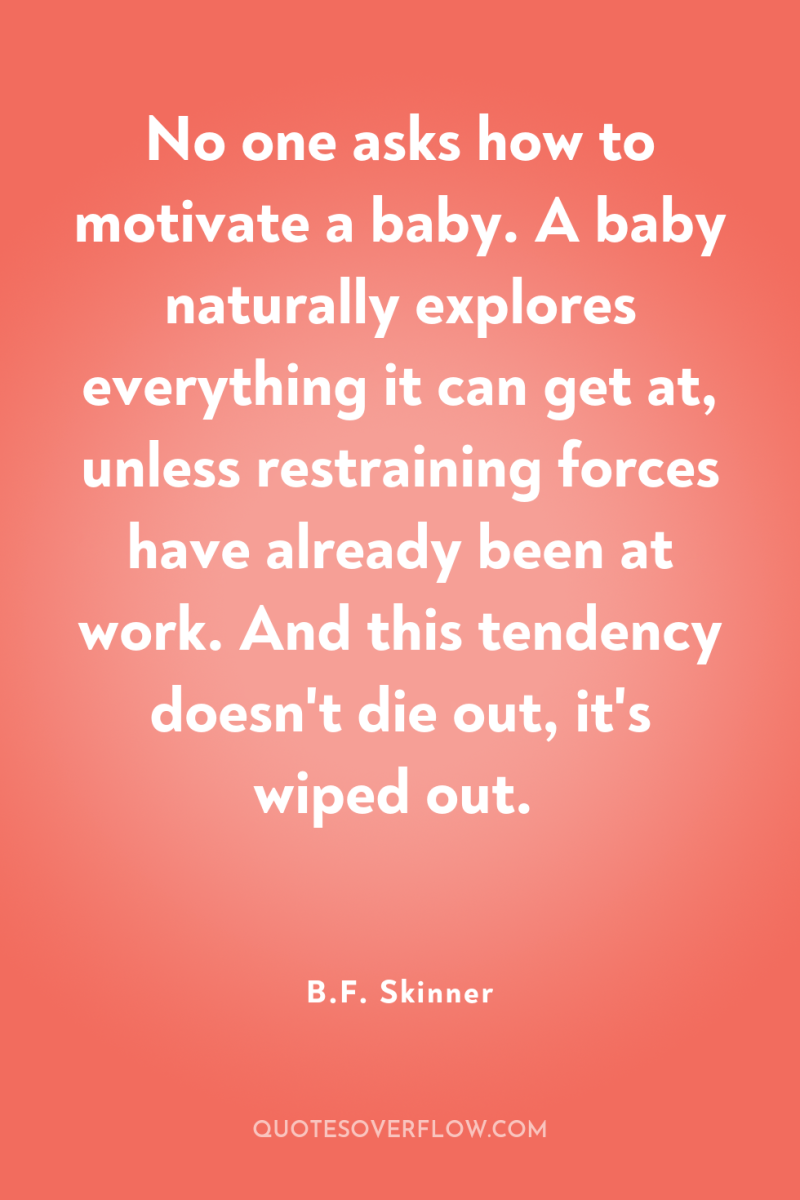1
A scientist may not be sure of the answer, but he's often sure he can find one. And that's a condition which is clearly not enjoyed by philosophy.B.F. Skinner

2
A fourth-grade reader may be a sixth-grade mathematician. The grade is an administrative device which does violence to the nature of the developmental process.B.F. Skinner
3
Why did colleges make their students take examinations, and why did they give grade? What did a grade really mean? When a student "studied" did he do anything more than read and think-- or was there something special which no one in Walden Two would know about? Why did the professors lecture to the students? Were the students never expected to do anything except answer questions? Was it true that students were made to read books they were not interested in? .B.F. Skinner
4
Once in a while a new government initiates a program to put power to better use, but its success or failure never really proves anything. In science, experiments are designed, checked, altered, repeated-- but not in politics... We have no real cumulative knowledge. History tells us nothing. That's the tragedy of a political reformer.B.F. Skinner

5
No one asks how to motivate a baby. A baby naturally explores everything it can get at, unless restraining forces have already been at work. And this tendency doesn't die out, it's wiped out.B.F. Skinner

6
At this very moment enormous numbers of intelligent men and women of goodwill are trying to build a better world. But problems are born faster than they can be solved.B.F. Skinner
7
Each of us has interests which conflict the interests of everybody else... 'everybody else' we call 'society'. It's a powerful opponent and it always wins. Oh, here and there an individual prevails for a while and gets what he wants. Sometimes he storms the culture of a society and changes it to his own advantage. But society wins in the long run, for it has the advantage of numbers and of age.B.F. Skinner
8
In the world at large we seldom vote for a principle or a given state of affairs. We vote for a man who pretends to believe in that principle or promises to achieve that state. We don't want a man, we want a condition of peace and plenty-- or, it may be, war and want-- but we must vote for a man.B.F. Skinner
9
A piece of music is an experience to be taken by itself.B.F. Skinner
10
Society already possesses the psychological techniques needed to obtain universal observance of a code -- a code which would guarantee the success of a community or state. The difficulty is that these techniques are in the hands of the wrong people--or, rather, there aren't any right people.B.F. Skinner
11
Your liberals and radicals all want to govern. They want to try it their way-- to show that people will be happier if the power is wielded in a different way or for different purposes. But how do they know? Have they ever tried it? No, it's merely their guess.B.F. Skinner
12
The only geniuses produced by the chaos of society are those who do something about it. Chaos breeds geniuses. It offers a man something to be a genius about.B.F. Skinner
13
Society attacks early, when the individual is helpless. It enslaves him almost before he has tasted freedom. The 'ologies' will tell you how its done Theology calls it building a conscience or developing a spirit of selflessness. Psychology calls it the growth of the superego. Considering how long society has been at it, you'd expect a better job. But the campaigns have been badly planned and the victory has never been secured.B.F. Skinner
14
The majority of people don't want to plan. They want to be free of the responsibility of planning. What they ask for is merely some assurance that they will be decently provided for. The rest is a day-to-day enjoyment of life. That's the explanation for your Father Divines; people naturally flock to anyone they can trust for the necessities of life.. They are the backbone of a community--solid, trust-worthy, essential.B.F. Skinner
15
Promising paradise or threatening hell-fire is, we assumed, generally admitted to be unproductive. It is based upon a fundamental fraud which, when discovered, turns the individual against society and nourishes the very thing it tries to stamp out. What Jesus offered in return of loving one's enemies was heaven on earth, better known as peace of mind.B.F. Skinner
16
The severest trial of oppression is the constant outrage which one suffers at the thought of the oppressor. What Jesus discovered was how to avoid the inner devastations. His technique was to practice the opposite emotion... [a man] may not get his freedom or possessions back, but he's less miserable. It's a difficult lesson.B.F. Skinner
17
Some of us learn control, more or less by accident. The rest of us go all our lives not even understanding how it is possible, and blaming our failure on being born the wrong way.B.F. Skinner
18
In a pre-scientific society the best the common man can do is pin his faith on a leader and give him his support, trusting in his benevolence against the misuse of the delegated power and in his wisdom to govern justly and make war successfully.B.F. Skinner
19
The tender sentiment of the 'one and only' has less to do with constancy of heart than with singleness of opportunity.B.F. Skinner
20
Fame is also won at the expense of others. Even the well-deserved honors of the scientist or man of learning are unfair to many persons of equal achievements who get none. When one man gets a place in the sun, the others are put in a denser shade. From the point of view of the whole group there's no gain whatsoever, and perhaps a loss.B.F. Skinner
21
Something doing every minute' may be a gesture of despair--or the height of a battle against boredom.B.F. Skinner